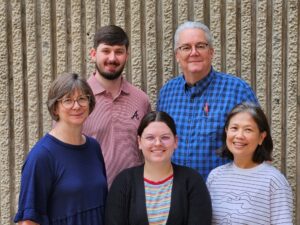Wayne P. Wahls, Ph.D.
 Professor
Professor
Ph.D., University of Illinois, Chicago
Email: WahlsWayneP@UAMS.edu
Office: 501-686-5787 – Biomedical Research Center B421C
Lab: 501-686-7876 – Biomedical Research Center B428, B430, B432
Fax: 501-526-7008
Chromosome Dynamics in Meiosis; Stress Response Pathways

Mari Davidson, Seth Dixon, Emory Malone, Wayne Wahls, Reine Protacio
During meiosis, homologous chromosomes replicate once, pair, enjoy a high rate of recombination, and undergo two rounds of chromosome segregation to produce haploid meiotic products. We use a combination of genetic, molecular, biochemical, cytological and proteomic approaches to study meiotic chromosome dynamics in fission yeast. Our primary focus is on how recombination hotspots and chromatin remodeling regulate recombination throughout the genome. We are also investigating how complexes of meiotic recombination enzymes assemble and function. A third focus is on the relationship between recombination, sister chromatid cohesion, and proper segregation of chromosomes in each meiotic division.
Proteins of the ATF/CREB/AP-1 family are components of signal transduction pathways that monitor intracellular and extracellular conditions and transmit those signals to downstream targets. These proteins share a conserved bZIP domain that mediates both protein dimerization and sequence-specific DNA binding activity. We are interested in how these protein-DNA complexes regulate chromatin structure, transcription and RNA decay, and how cross-talk between pathways confers plasticity to environmental stress responses.
Research Projects
Selected Publications
Protacio R.U. and W.P Wahls (2025). Targeted forward genetics: Saturating mutational analyses of specific target loci within the genome. Methods in Molecular Biology 2862:223-239. doi: 10.1007/978-1-0716-4168-2_16. [Abstract]
Protacio, R.U., S. Dixon, M.K. Davidson and W.P. Wahls (2024). Creating meiotic recombination-regulating DNA sites by SpEDIT in fission yeast reveals inefficiencies, target-site duplications, and ectopic insertions. Biomolecules 14:1016. doi: 10.3390/biom14081016. [Abstract]
Protacio, R.U., M.K. Davidson, E.G. Malone, D. Helmlinger, J.R. Smith, P.A. Gibney and W.P. Wahls (2024). Agar lot-specific inhibition in the plating efficiency of yeast spores and cells. G3: Genes, Genomes, Genetics 14:jkae229. doi: 10.1093/g3journal/jkae229. [Abstract]
Protacio, R.U., E.G. Malone and W.P. Wahls (2024). Distance-dependent effects on CRISPR/Cas9-mediated genome editing in Schizosaccharomyces pombe compromise efficiency and create unsought alleles. micropublication Biology 2024:001248. doi: 10.17912/micropub.biology.001248. [Abstract]
Hong, Z., A.K. Byrd, J. Gao, P. Das, V.Q. Tan, E.G. Malone, B. Osei, J.C. Marecki, R.U. Protacio, W.P. Wahls, K.D. Raney and H. Song (2024). Eukaryotic Pif1 helicase unwinds G-quadruplex and dsDNA using a conserved wedge. Nature Communications 15:6104. doi: 10.1038/s41467-024-50575-8. [Abstract]
Gao, J., D.R. Proffitt, J.C. Marecki, R.U. Protacio, W.P. Wahls, A.K. Byrd and K.D. Raney (2024). Two residues in the DNA binding site of Pif1 helicase are essential for nuclear functions but dispensable for mitochondrial respiratory growth. Nucleic Acids Research 52:6543-6557. doi: 10.1093/nar/gkae403. [Abstract]
Protacio, R.U., E.G. Malone and W.P. Wahls (2024). DNA sequences and distinct mechanisms for ura4-595 and ura4-294 alleles of S. pombe. microPublication Biology 2024: 01139. doi: 10.17912/micropub.biology.001139. [Abstract]
Protacio, R.U., M.K. Davidson and W.P. Wahls (2022). Adaptive control of the meiotic recombination landscape by DNA site-dependent hotspots with implications for evolution. Frontiers Genetics 13:947572. doi: 10.3389/fgene.2022.947572. [Abstract]
Protacio, R.U., T.O. Mukiza, M.K. Davidson and W.P. Wahls (2022). Molecular mechanisms for environmentally induced and evolutionarily rapid redistribution (plasticity) of meiotic recombination. Genetics 220: iyab212. doi: 10.1093/genetics/iyab212. [Abstract]
Complete List of Published Work in My Bibliography
